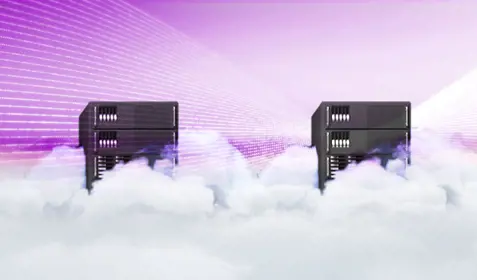Cloud storage and cloud backup may sound like the same thing, but they are actually different.
Cloud backup refers to tools that protect your data, files and system from a catastrophic event like ransomware or theft. Cloud storage refers to tools that let you free up space on your device by having copies of some files saved to the cloud.
Simply put, cloud storage services do not provide comprehensive protection or the same peace of mind that cloud backup services offer.
Let’s dive deeper to understand the differences between cloud terms like cloud storage and cloud backup.
What is cloud storage and how does it work?
Cloud storage allows you to keep some of your files outside of your primary devices. Cloud storage services like Dropbox and OneDrive are good for storing files, photos and videos to one centralized location – the cloud. You can access your files from any device and easily share files with friends and family; it also allows easy syncing.
But cloud storage isn’t the same thing as backup.
If your data goes missing -- say your computer crashes or gets stolen – and if you haven’t been constantly moving your updated files to your cloud storage, then you will lose the files that weren’t manually uploaded. Even if file sync is turned on, if a file on a laptop is deleted or gets infected with malware, data gets deleted or infected on both sides. And cloud storage doesn’t cover anything – you might recover the photos you saved to the cloud but your documents could be lost forever.
This is where cloud backup comes in.
When using the cloud, are other backup technologies still necessary?
Cloud backup – also known as online backup -- is specifically designed for making copies of your files and ensures continuous backup and offers an easy way to restore your files.
Protecting your files, documents and data with technology that’s specifically built for backing up is the only way to ensure that your data is safe. With cloud storage, some of your files are safe some of the time. With cloud backup, you have 24/7 comprehensive protection that guarantees business continuity.
Pros and cons of cloud storage
Pros:
- Storing files in one centralized location
- Sharing files with friends, relatives and coworkers
- Synchronizing files across devices
Cons:
- Automatic, comprehensive backup of all computer files
- Continuous monitoring for changes
- Private encryption key for security and privacy
- Uniform policy controls for backup and retention
- Regulatory support, including HIPAA, FERPA and GLBA compliance
What is cloud backup and how does it work?
Cloud backup – also known as online backup -- is specifically designed for making copies of your files and ensures continuous backup and offers an easy way to restore your files.
Backup services offer file versioning, which means in the event of data loss – say, your computer gets infected with ransomware – you will be able to recover a clean version of your file from a point in time before your system became infected.
Pros and cons of cloud backup
Pros:
- Automation – True cloud backup doesn’t rely on users to manually drag and drop files or upload them to the cloud. It should automatically work in the background, backing up all user files and data, and scanning for changes along the way.
- Versioning – With cloud backup, earlier versions of files are stored, so even if you overwrite a file, you can still recover it from an earlier backup.
- Encryption – In most cases, a cloud backup service will encrypt your files before uploading to the cloud and send it through a secure tunnel using advanced encryption technology. Not all cloud storage providers give you this feature, especially ones designed for consumers.
- Privacy – Different cloud service providers have different policies regarding data privacy, but a trusted backup provider would never compromise customer data privacy, or allow anyone else to do so, for marketing purposes, service enhancement or any other reason. Beware the fine print with free cloud storage providers.
- Recovery – Cloud backup also enables you to log in to your account and restore data to replacement hardware. So, if you have a local failure, you can recover with minimal interruption. And if you run a small business, Carbonite Disaster Recovery as a Service (DRaaS) reduces the risk of unexpected downtime and ensures business continuity after an accident, cyber attack or natural disaster.
- Control – You have much more control over your data when you determine your backup policy, and have it automatically implemented by your backup solution. This greatly reduces the chances of human error compared with an ad hoc, manual process.
How to use cloud backup
To get started, you need to settle on a cloud backup service. You should look for industry leaders with strong reputations. And you should keep your eye out for features like automatic backups. Carbonite® backup installs a client on your device that automatically seeks out new files and saves them securely to the cloud.
Cloud storage vs. cloud backup: Key differences
- Cloud storage is designed to supplement your hard drive space and makes it easier to access and edit files from different devices. Cloud backup is designed in a way that you can restore files in the event of data loss.
- With cloud storage you must manually select files you want to store in the cloud, while cloud backup services work automatically to save and sync files stored on your computer.
- Cloud backup providers are serious about keeping your data secure: Your files are usually encrypted both on transfer and on storage. But with most cloud storage services, files can only be encrypted on the server side, making the data transfer process less secure.
- Carbonite offers cloud backup solutions that meet the needs of individuals and businesses alike.
Interested in automatic cloud backup?
Frequently asked comparison questions









